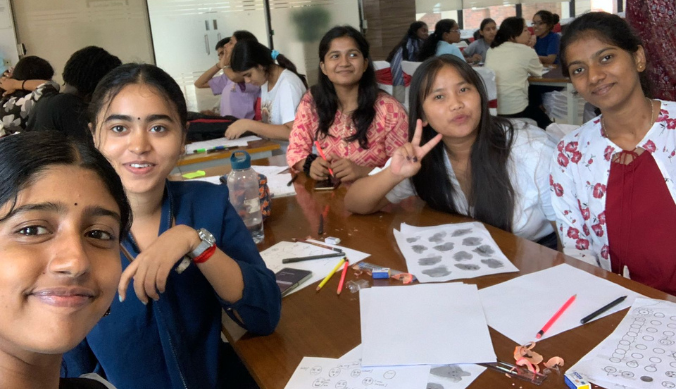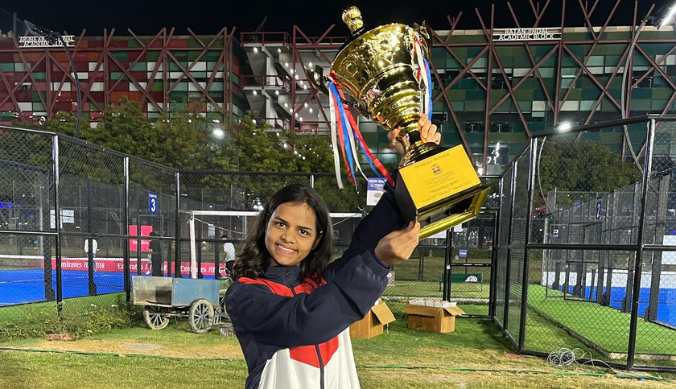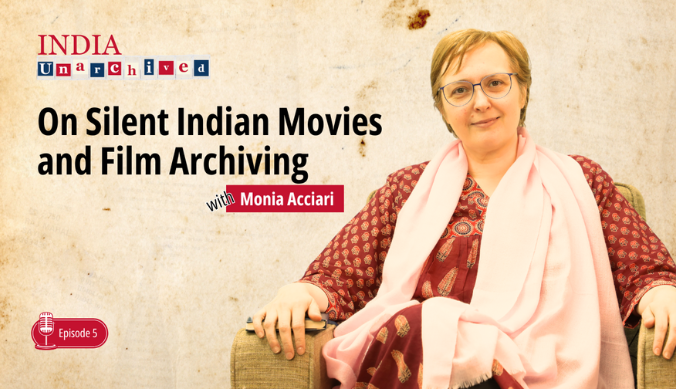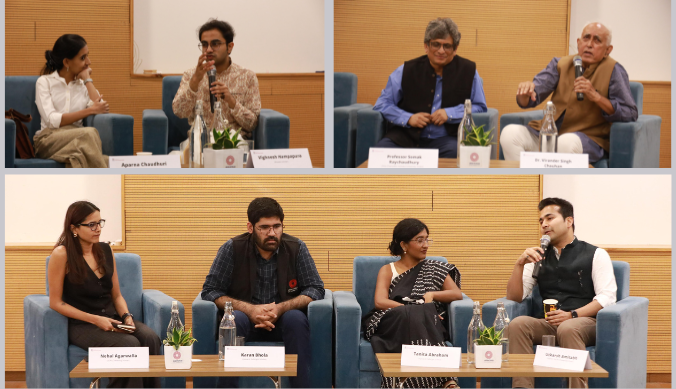Dreams to Reality: A First Generation Graduate’s Path to Harvard
YIF Alumna Ashweetha (YIF ‘13) will be joining Harvard Kennedy School’s prestigious mid-career Masters in Public Administration Programme in the coming months
Hailing from Mukkudal, a village in Tirunelveli district in Tamil Nadu, Ashweetha’s story is remarkable in multiple ways. Her parents rolled beedis (local handmade cigarettes) for a living. She challenged societal conventions by pursuing education, ultimately becoming the first in her family to earn a college degree. Motivated by the struggles faced by the women in her life, she established the ‘Bodhi Tree Foundation’ to empower rural youth in realising their potential. Through her initiative ‘Penn Collective,’ she advocates for women’s rights and equal representation of women in politics and leadership roles. For her work as the Founder and CEO of Bodhi Tree Foundation, Ashweetha has been awarded the Working Women Achievers’ award and Chief Minister State Youth Award.
We recently spoke to her about her journey, her grassroot community organisations, the impact she has been creating and her recent admissions to Harvard Kennedy School, Here is what she had to say:
Let us start with your YIF journey and to where it has led you.
In my final term paper for “Shakespeare and the World,” I wrote about the untapped potentials and unexplored emotions of the women in Othello. It was one of the very first courses taught at the YIF, and I believe that’s where my journey started. The fellowship irreversibly altered my perspective about myself and the world around me. Each day spent there offered a chance for introspection, allowing me to dream, to be brave, and aspire more. It was also my first real encounter with the stark realities of social inequality.
At YIF, I learned to comprehend how entrenched the status quo (particularly poverty and culture) systematically marginalised people like me. Growing up, I never felt the weight of poverty or gender discrimination. I had been oblivious to the extent of these disparities, thinking that it was a norm to be poor and to be submissive as a woman. I had no point of reference until I went to Delhi. There, I grappled with questions of identity and gender and how they dictated access to opportunities.
At the fellowship, I felt a strong urge to go back to my village and help girls like me. I couldn’t stand seeing their potential wasted. I realised that the only barrier standing between individuals like myself and reaching our full potential was an ‘opportunity’. So, I started the Bodhi Tree Foundation, to bridge the rural-urban divide by supporting local graduates to explore their potential by giving them access to life skills and career opportunities.
How did you go about finding your calling and committing to it?
My childhood memories are etched with my grandmother’s mud-stained feet and my mother’s calloused hands. My grandmother endured the hardships of modern slavery, toiling as a farm laborer for essentials like rice and shelter, while my mother spent her life rolling beedies (country cigarettes) to make ends meet. As a girl growing up in rural Tamil Nadu, I often felt invisible, constrained by societal expectations. Fortunately, I discovered the voices of Irom Sharmila and Helen Keller, in our village library. Their stories showed me that I could defy the limitations imposed by my gender and socioeconomic status. With unwavering determination, I pursued my education, becoming the first in my family to graduate from college.
One thing that stands out vividly from my childhood: I remember sitting alongside my mother and her friends with a beedi-rolling dhabba, cutting tobacco leaves. They would start work with chalk and broken glass bangle pieces drawing a grid, like a chessboard. A broken bangle piece would be placed in a square, for every 100 beedies, the bangle piece would be moved, and this process continued until the last square was filled. While I saw them achieve these everyday goals with deep commitment, I also listened to their stories of struggle – of poverty and debts, of discrimination and patriarchy, of violence and abuse, of choicelessness and hopelessness.
The discrimination they faced, the limitations imposed on them, and the struggles endured by the women in my life have deeply influenced the way I look at the world. Their hopes and ambitions have played a significant part in shaping my aspirations and my commitment to strive for a gender-equal world. Every day, I am reminded that I am standing on the shoulders of my grandmother, my mother, my sister and all the women who came before me who enabled me to dream beyond my circumstances and enable the life I live today – a life characterised by agency, choice, and freedom. Now, I am driven to pay forward the opportunities I’ve been given, empowering as many women as I can along the way.
How do you balance your commitment to grassroots initiatives like Bodhi Tree and Penn Collective with your involvement in global organisations like The World Bank?
I am currently a World Bank Consultant assigned to the Tamil Nadu Women’s Employment and Safety project – a USD 150 million initiative financed by the World Bank and my role is to facilitate operational engagement with the Government of Tamil Nadu. I believe that the lack of access to opportunity is failing so many people in our world. Fortunately, I got into the Young India Fellowship (YIF) program, and that one opportunity changed my life. I completed my fellowship in 2013, and in 2014, I returned to my village to start a non-profit, the Bodhi Tree Foundation, to support first-generation rural college-goers like myself who come from socially, economically, culturally, demographically, and historically disadvantaged backgrounds. Through a variety of foundation programmes, I have reached out to over 10,000 girls in the past six years, offering them the crucial assistance they need to follow their aspirations and change the world despite obstacles like poverty, broken homes, domestic abuse, and unstable upbringings.
I constantly asked myself, “How do we equip these girls to fight the invisibility that comes not only from being a girl but in many cases, being poor, being a person born into a marginalised caste, and being someone from a disadvantaged demographic?” These identities have the power to inform their life prospects, and their future is out of their control. When I think about what could happen if these girls get the right support system, it becomes very hard for me to reconcile.
These experiences at the Bodhi Tree Foundation was a major impetus to join politics because it cemented my passion for women in leadership positions. In March 2023, a friend of mine and I launched a women’s collective called “The Penn Collective,” which translates to “women’s collective” in Tamil. We realised that for women’s issues to be recognised, women themselves must be acknowledged. To achieve this, we aimed to identify and eliminate barriers preventing women from accessing information, resources, opportunities, and support systems in political and public settings. This led us to form the collective.
Through The Penn Collective, we aim to empower women (including ourselves) to become strong political forces and compete for and win elections at various government levels, ultimately boosting women’s representation in politics. We organised online and offline campaigns such as Engal Kalam Engal Kanavu (My Space, My Dream Campaign) and the Penniyam Pazhagu Series (Learn Feminism series), bringing together men and women to discuss topics like reclaiming bodies, public spaces, workplaces, and agency in marriage. Additionally, we conducted workshops on political and constitutional topics throughout the year.
Have there been moments when you felt discouraged or overwhelmed by the magnitude of the issues you’re addressing, and how did you navigate those feelings?
When I feel discouraged or overwhelmed, I remind myself of the price of failure, the price of inaction. I find solace in David Whyte’s poem, “Start Close in” and anchor myself in the uncertain nature of life, which allows me not to take things too seriously. I also remind myself that within each of us resides both angels and beasts, and it’s our choices that define us.
I deeply believe luck played a significant role in achieving my dreams, yet I view my life as a collection of chosen experiences leading up to this moment. The courage to apply to a top university and securing a scholarship feels like the culmination of those experiences. It’s now my mission to leverage the opportunities I’ve been given to challenge the paradigms that perpetuate women’s marginalisation in disadvantaged communities. I see it as my duty to ensure these women have every chance to integrate from margins into the mainstream.
What role do you believe storytelling plays in inspiring social change, and how do you use your own story to motivate others?
Growing up, I was always curious about my mother’s and grandmother’s lives—what food they ate, the clothes they wore, and how they celebrated festivals. Sitting with women in the narrow lane near our house, everyone rolling beedies for a living, I’d listen to their stories and wonder about my own future. Stories became my way of understanding the world.
Growing up amidst normalised discrimination, I became accustomed to being silenced, dismissed and ignored. The idea of men raising their voices or hands at women felt routine, a grim reality I accepted. Freedom, having a voice, and making choices were foreign concepts. It took time to realise that we’re shaped by the reality we unquestioningly accept. Challenging these norms is a daunting journey, requiring an awakening. I aspire to instill the audacity to dream in the millions of girls like me growing up in rural India. Just imagine if even one of those dreams came true—the world would be a better place for everyone.
How do you define success in your personal and professional life, and how has that definition evolved over time?
As a first-generation learner, my initial drive was to prove to my parents that I could achieve something significant. This motivation guided many of my decisions—such as studying diligently for government exams, excelling academically, and striving for a life that would help my family rise out of poverty.
Growing up in a rural, impoverished Indian household, I witnessed firsthand the struggles faced by girls, often overlooked and denied opportunities for social advancement. I believe these experiences propelled me to envision a more equitable society where every child, regardless of circumstance, could access quality education and realise their potential. At the Young India Fellowship (YIF), my faculty and guest lecturers insisted on being socially responsible and made us believe we had to contribute to nation-building. I remember in the last class of our business class, Professor Rajiv Lochan encouraged us to think about what success means to us in our lives, whether it is money, fame, power or satisfaction. He also said none of these choices are bad. I believe it was the Young India Fellowship (YIF) that changed my definition of success and made me more aware of how my life could be made useful for others. My time at Bodhi Tree further solidified my commitment to promoting gender equality and women’s empowerment across all walks of life—in the economy, in politics, in social and public life.
Personally, my experience as a consultant in the Tamil Nadu Women’s Employment and Safety Project was powerful because the project I worked on looked at women as potential contributors of economic growth rather than the usual approach the government takes with women’s projects as welfare ones. It helped me understand the effects of social institutions on development outcomes. It helped me to understand women’s issues like care burden, women’s safety, gender based violence, unequal pay, gendered jobs, social norms and biases against women.
A legislative panel on women’s marriageable age in India in January 2022 featured just one woman out of 31 members, underscoring the glaring gender disparity in decision-making entities. Globally, data from the Inter-Parliamentary Union and UN Women reveal alarming timelines for achieving gender parity in political leadership. This reality fuels my drive to ask, “What are we doing to advance women in politics?” The glaring gender disparity in political decision-making bodies only accentuates the urgency of my mission to empower women in politics and nurture the next generation of female leaders.
Maya Angelou’s words, “Each time a woman stands up for herself, without knowing it possibly, without claiming it, she stands up for all women,” deeply resonate with me. I am committed to supporting female lawmakers and aspiring politicians in their political journeys.
I firmly believe that democracy thrives when all voices, particularly those of historically marginalised and silenced women, are heard. I believe we deserve women who represent us, who represent our voices, our dreams, and our aspirations. These women exist and all they need is a support system.
Your future goals and aspirations
I dream of a world where every individual has the freedom and opportunity to live a fulfilling life. As someone who comes from a disadvantaged background, I am deeply committed to advocating for women, striving for a future where they hold 50% of all leadership roles, particularly in political spaces. I believe that empowering these women to rise and seize opportunities can catalyze profound global development and societal progress.
My journey towards a degree in public policy is not a direct one. It was shaped by a series of defining moments that illuminated my path forward. Now, I am certain that to enact change, I must deepen my understanding of public policy. I believe in a ‘public policy’ that truly includes everyone, and I am driven to transform the current system, which too often overlooks, invalidates, excludes, and dehumanises those it is meant to serve. I genuinely want to deepen my understanding of the complex developmental problems and learn how to solve them at scale.
I am aware that the path to politics comes with its challenges – entrenched patriarchal norms, a lack of support, and societal prejudices such as misogyny and sexism. These hurdles have only sharpened my resolve to build the necessary tools, resources, and networks that will enable me to enter and persist in the male dominated political system.
With a MPA degree, I hope to be equipped to advocate effectively for transformative change. After my studies, I am eager to jump into mainstream politics, committed to shaping a more equitable and just future. This isn’t just my career path—it’s my calling.
(Ashweetha is an alumna from the Young India Fellowship (YIF) class of 2013. She is an independent consultant working with NGOs and Government Departments, TED speaker, an Acumen India Fellow, G.P Birla Fellow, co-founder of Penn Collective, founder of Bodhi Tree Foundation and Social Worker. She most recently was a World Bank consultant. She holds a Bachelor of Arts in Business Administration from Manonmaniam Sundaranar University and was the second President of the Ashoka Alumni Association.)
Study at Ashoka













